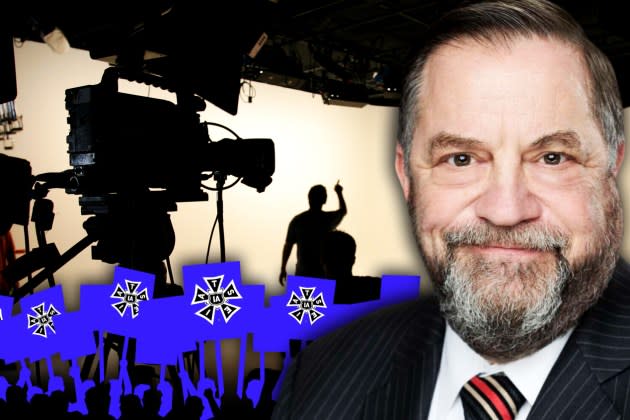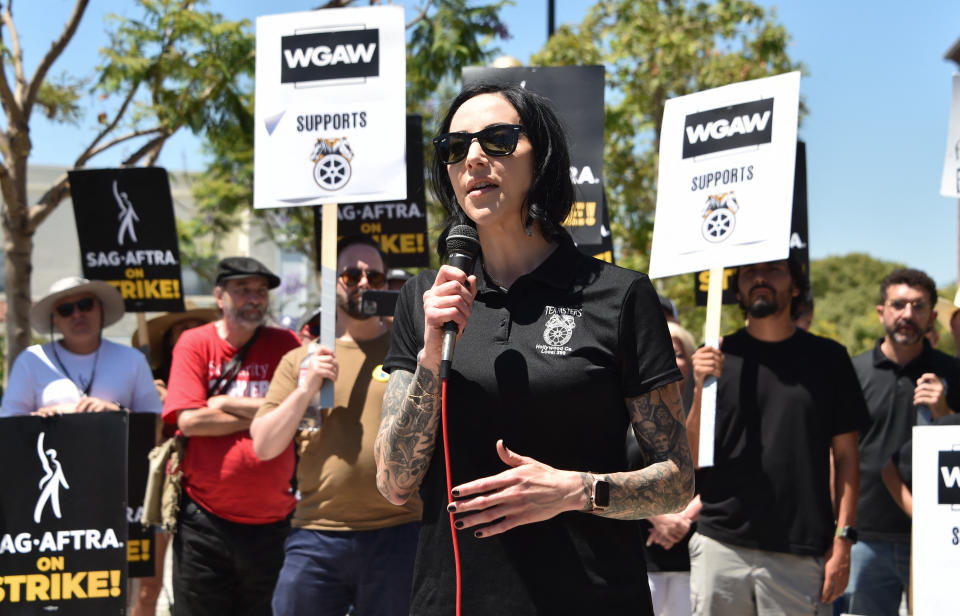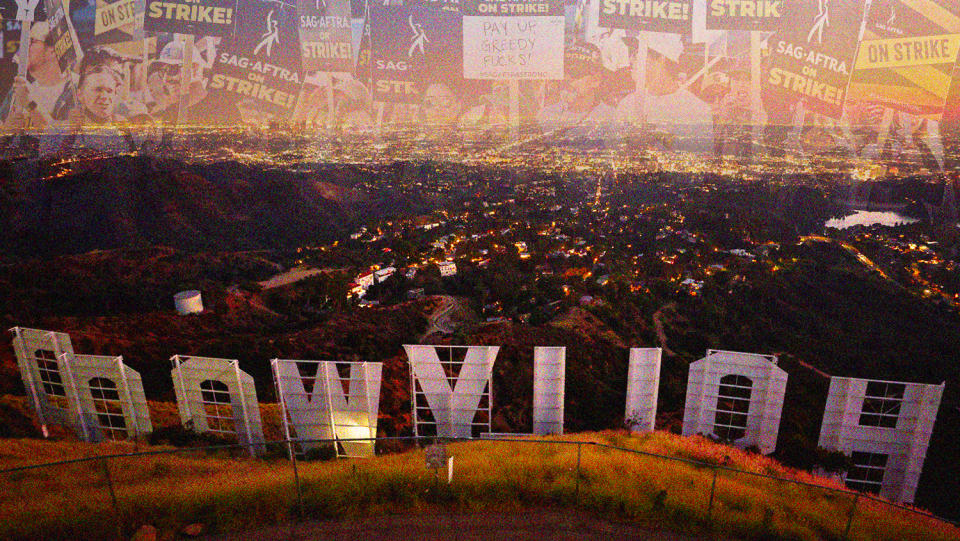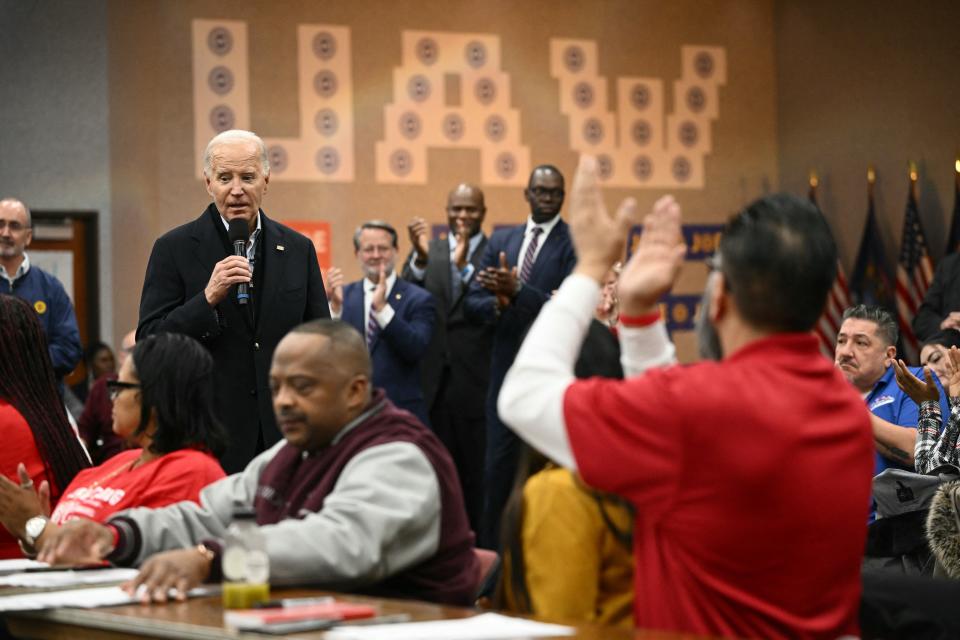IATSE Boss Matthew Loeb On “Precarious” Hollywood, Upcoming Studio Talks, Sunday’s Rally With The Teamsters, & Election 2024
- Oops!Something went wrong.Please try again later.

In many ways, longtime International Alliance of Theatrical Stage Employees president Matthew Loeb is the personification of that Teddy Roosevelt adage of “speak softly, and carry a big stick” …well, maybe except for the speak softly part.
“From where I sit, this is really about security in an industry that is precarious already,” Loeb states of the upcoming talks starting March 4 with the Alliance of Motion Picture and Television Producers on new three-year agreements. “A strike vote is always possible and I can’t rule it out,” the veteran union leader adds of the stakes involved for his members and the latest contract talks.
More from Deadline
Heading into joint negotiations with studios with the Lindsay Dougherty-led Hollywood Teamsters and other crafts on Monday, Loeb arrived in LA earlier this week for last minute preparations with his team and other leaders. Fittingly, with support from all the other Guilds, Loeb also came loaded for bear to take the stage tomorrow at a self-described Nothing Moves Without The Crew mega-rally in Encino.

With their current film and TV contracts set to expire on July 31 and the union having stated last month they are not interested in extending it, IATSE are also going into talks with the Carol Lombardini-led AMPTP in the aftermath of last year’s bruising strikes by the WGA and SAG-AFTRA. In fact, two separate contracts are on the table for IATSE. Covering more than 60,000 industry related members, there’s the Basic Agreement, which covers 13 of the union’s Hollywood locals, and there’s the Area Standard Agreement covers 26 locals outside of Los Angeles.
Back in 2021, after an overwhelming nationwide strike authorization vote by members, the last contracts were ratified by members in a closer than usual vote. A vote that saw the L.A. locals reject the deal in the popular vote.
All of which adds up to Loeb, who has been head of IATSE through good times and not so great times, since 2008, having to a manage a lot of voices and a lot of interests as he and his Negotiating Committee face the studios this time. Talks that begin with bracing cuts at the studios and a production at a trickle from what is has been in recent years.
Loeb sat down with me to discuss the open coming negotiations, the wage and job security issues, as well as new way of looking at AI. Additionally, the labor boss took a big picture look at where the overall union movement is in 2024, the importance of having a friend in the White House, and the “unthinkable” prospect of Donald Trump defeating Joe Biden this November.
DEADLINE: You’re going to be across the bargaining table from the AMPTP on Monday morning, a place you’ve been many times before. The studios have a well-thumbed playbook of divided and try to conquer, a playbook that seemed very out of touch against the WGA and SAG-AFTRA in the end last year. Do you think anything will be different with Carol Lombardini and gang after last year’s strikes?
MATTHEW LOEB: I’m hopeful that they learned about, just saying no and seeing what happens as we approach a cliff. What I’m interested in is meaningful discussions that address real issues. So, that’s in their hands, but my guess is that they have figured out thew old playbook is just notgoing to cut it this time.
DEADLINE: Not worried that they think they can push you guys off the cliff by trying to put an industry disruption prematurely on the Guilds?
LOEB: (Chuckle) My feeling about that is that if anybody assesses our strength from that perspective, it’s a mistake. It’s a mistake because of the constructive role of unions in Hollywood and around the country and entertainment. It would be foolhardy in my opinion, for anybody to believe that we will just take any deal. We won’t.

DEADLINE: I’m going to be honest with you, you are a union leader who clearly gets adrenalized around your members, around union folks. So, with this rally coming up this weekend with Lindsay Dougherty and the Teamsters and others, what’s Matt Loeb going to tell the troops from the stage going into Monday’s talks?
LOEB: I can’t tell you everything Dominic, but what I will tell you is most of what we’re going to be talking about goes to the heart of security.
DEADLINE: How do you mean?
LOEB: Security that in this precarious business is not dependable enough. It need to be. When I say that I’m talking about the benefits. I’m talking being able to spend time with your families, to the health in the industry, to making a fair wage for the work that folks do. So, Sunday’s rally, the negotiations, really it’s all about securing the future for the members and their families.
That’s the big message, and maybe I’ll be saying it a little louder on Sunday. (LAUGHS)
DEADLINE: Another big message is that IATSE, Teamsters Local 399 and other Hollywood Basic Crafts are going into together to bargain over benefits such as healthcare and pensions. This is not the first time you’ve all worked together, but in this round, how did that strategy come together?
LOEB: Well, keep in mind that we’re only going in together for the negotiations for the benefits, and then we’ll split because of the specifics of the crafts and the structure of the different organizations.
The reason for it is twofold.
One, they’re in our benefit plans, our benefit points to their benefit plans as well. So, their interests are identical to ours. I think that going in together creates solidarity and strength hopefully manifest itself in a better deal at the end.
As far as the more individual priorities are concerned, we share priorities with the Teamsters, especially on issues like AI and how that affects future work. From where I sit, this is really about security in an industry that is precarious already. Because what we are talking about jointly is these benefit plans that are among the most important things that we provide for people who work for so many different employers over the year.
DEADLINE: So, this is a two-track thing in many ways?
LOEB: They’re not separate. I mean, I would be shocked if the employers didn’t add up the cost of the benefits before they made a final offer. For us, IATSE I mean, I don’t anticipate that we’re going to finish. I mean, I hope that we do finish the benefits forthwith, but it may take some time. In terms of the general proposals, we’re going to start bargaining on those probably also next week. As you can gather, there’s going to be some process involved.
There will definitely be overlap, and look, you got to step back a little just because we’re going in with the Teamsters and Basic Craft for the issues that we have that are common. That doesn’t mean that it’s a separate part of the agreement. There’s no world in which we make a deal on benefits and not wages or vice versa.
DEADLINE: Outside process for a sec, union solidarity and job security used to be almost dirty words in America, under successive administrations. Talking the 35,000 feet perspective, that’s changed a lot since Joe Biden took office, I think it is fair to say. So, in that context, in the context of last year’s strikes and deal, and your own upcoming talks, what your take on the state of the labor movement in Hollywood today?
LOEB: One thing, for sure, everybody is more aware of what’s going on, I think, than they ever have been before. I think that labor in Hollywood also reflects a movement in the country.
DEADLINE: How do you see that?
LOEB: I see it, you’ve seen it, with the number of strikes, but also the amount of organizing.
If you look at the public opinion about unions today, the numbers are very good.
We’re in an environment with a president who has been pro labor his entire life. That affects the Labor Board and that affects the Department of Labor and other issues that bear on our day-to-day work. So, we’re in the sweet spot, right now with the labor movement. Also, as for Hollywood, as a result of the disputes last year, there’s, I think, a keen interest by lots of folks in the industry, about how this plays out.

DEADLINE: With what looks like the inevitable rematch between President Biden and the former Celebrity Apprentice host/ex-president Donald Trump, what’s your level of concern that another Hot Labor Summer could lead to having greater political consequences in the larger labor context and in that race?
LOEB: Could go either way.
DEADLINE: How?
LOEB: Folks, I guess, could feel the threat of being on strike losing work, not qualifying for benefits. But also, I think people can get ramped up behind politics and behind this race especially. You can say what you want about Joe Biden, I’m a big fan, but the alternative is unthinkable.
DEADLINE: So, as you go into next week’s talks and with a lot of people on edge that a new round of strikes may be coming this year, how does this play itself out?
LOEB: The first thing is we’re certainly not interested in any kind of benefit cuts or more difficult qualifying measures in the design of the benefit plans. We would like to improve the benefits and have the funds available to do that, including pension benefits for retirees. We have some measures in place, but they’re based on triggers – like we provide 13th and 14th checks to retirees each year who retired after or before a certain date. We want to make that permanent. It’s expected and has been provided for a long time and people anticipate it and it’s an improvement that really helps the retirees.
DEADLINE: During the last round of bargaining that IATSE had with the studios in 2021, you brought in a strike authorization vote, a vote that was that union’s first nationwide strike authorization vote and passed with the support of 98% of the 89% of members who voted.
LOEB: Yes…
DEADLINE: There was no strike obviously three years ago, but it was tense to put it mildly After you had an agreement with the AMPTP and it passed by a tight margin, a member said to me “2024 is going to be a showdown.” So, where are things at with a strike authorization vote this year?
LOEB: First thing, remember, we didn’t have a strike authorization vote at the beginning of the last negotiations we had a strike authorization vote after the negotiations ground to a halt and the producers basically said we don’t know how to deal with what we’re negotiating, and we can’t answer you. We did a lot of work including lobby in DC, a lot of work including that strike vote to push them back to the table. A strike vote is always possible and I can’t rule it out.
DEADLINE: To that, late last year, I believe around October, the negotiating committee began gathering members input for this upcoming round of talks through bargaining surveys and other means. Based on that, what have members come back to you with if anything that has surprised you in terms of their concerns going into these negotiations.
LOEB: I’ll say, nothing that I’m really surprised by.
DEADLINE: So, I’ll assume that means wages and job security…
LOEB: Let’s say, we’ve had the most transparent and inclusive preparation that we’ve ever had before. We trained as many people as we could, who will be involved in bargaining, so they would know the lay of the land, what good faith bargaining means and what the laws are that surround it. We want our folks to be best equipped as they can be at the table.
DEADLINE: Sounds like a decentralized philosophy …
LOEB: Well, it’s not just me there, is it? I may be the tip of the spear, but I need a room full of people who have resolve, knowledge and fortitude.
DEADLINE: In this gig-based economy, one of the big shifts taking place is the growing use of AI across almost all industries, and especially the entertainment industry. That was a massive part of the talks between the WPA and SAG-AFTRA and the AMPTP last year, and a real conundrum in many ways. IATSE obviously has its own AI concerns. What do you think about AI and how it could affect or harm your members as well as the greater Hollywood community?
LOEB: I’ll tell you: What we’re going to try to do is to prevent harm through bargaining
DEADLINE: How does that work?
LOEB: We’re analyzing, we’ve engaged Carnegie Mellon to advise us to make sure that we understand where it could be headed. We just have to have a human based approach. It has to be something that takes into consideration people’s need, again, for security, a
And that’s job security. That’s the root of how they get their benefits and the rest of their security.
You know, it’s a little more difficult for us because we’ve got so many different crafts and trades. We’re going to be proposing provisions that hopefully that are uniform throughout these crafts to to protect job opportunities, and to train people.
DEADLINE: But surely part of the use of AI is to cut human costs, to have the tech do the jobs…
LOEB: Obviously, we’re interested and concerned about protecting jobs and standards. But what if the spoils of AI are shared and it takes pressure off the business or makes it more efficient that shouldn’t mean that people lose work. Hear me out. Maybe it manifests itself in a way that flows down, not just up in efficiency, as far as revenue to the company’s goes. Maybe, it is used to but take some pressure off of the schedules and some of the work that we do and maybe longer days. Maybe that’s a way we can make this work in the right way.

DEADLINE: You have been IATSE president since 2008…
LOEB: Yes
DEADLINE: That’s a lot of negotiations, a lot of change in an industry that is truthfully always changing. So, going into Monday’s talks, with so much at stake, so many issues to be addressed, what it at the top of mind as you prepare for the start of negotiations with the studio, the AMPTP?
LOEB: I’m not dodging the answer, but I’ve always been guided by what is best for the members and that’s at the top of my brain.
I’m looking at the challenges, the effects of AI, the technology that’s coming to the distribution changes. We’ve been in the gig economy since 1893. We know it’s precarious, but things can be done and should be done to make folks more secure.
Best of Deadline
2024 Awards Season Calendar - Dates For Oscars, Guilds, Tonys & More
TV Cancellations Photo Gallery: Series Ending In 2024 & Beyond
Hollywood & Media Deaths In 2024: Photo Gallery & Obituaries
Sign up for Deadline's Newsletter. For the latest news, follow us on Facebook, Twitter, and Instagram.

